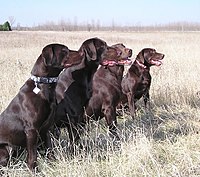 Image via Wikipedia
Image via Wikipedia
Selecting the right food for your Labrador Retriever should not be a random choice, as no other decision will have a greater impact on the overall well-being of your dog. What the dog eats affects his nutrition, and nutrition directly relates to overall health and longevity. A dog's diet should be high in protein, with an ample supply of carbohydrates, fat, vitamins, and minerals. These requirements are easily met by selecting nutritionally complete products.
Most single-pet households purchase their dog's food from the supermarket. Often, pet owners are swayed into trying certain brands by price, packaging, and advertising. But the most popular brands may not be the best buys for your dog.
There are three main types of dog food: canned, semi-moist, and dry; with the occasional table scraps. Each of these used as the sole diet presents problems. A diet consisting exclusively of canned and semi-moist foods can wreak havoc with a dog's digestive system, teeth, and gums.
Some dry foods must be taken in massive amounts to obtain all of the nutrients that are essential. And table scraps can throw a well-balanced diet right out of order. However, in spite of these pitfalls, there is no reason to despair. With a little research such as reading the labels and comparing and perhaps some trial and error, you should be able to work out the proper balanced diet for your Lab.
Canned dog food should never be served as the only food. First of all, it is very high in water content (approximately 75%) and you end up paying hefty prices for little real substance. The meat used in canned food is certainly not from choice cuts, either, so do not let evasive television commercials fool you into thinking canned food is optimal. In addition, the additives that are commonly used in canned foods, such as coloring and preservatives, are basically non digestible by the dog and can have a diuretic effect. Add this to the high water content and you will understand why a dog eating primarily canned food will have an increased need for urination and potential housebreaking problems.
However, there are some canned foods that are better than others, notably the ones designed for the different stages of a dog's life. But even these should make up no more than ผ of the dog's daily intake and should be used in conjunction with a quality meat/meal-based dry food.
![Reblog this post [with Zemanta]](http://img.zemanta.com/reblog_e.png?x-id=a5af1c01-8745-4a3e-9e77-7c40240b1215)
ไม่มีความคิดเห็น:
แสดงความคิดเห็น